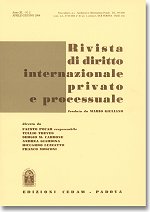Global Forum on Private International Law & 2017 Annual Meeting of China Society of Private International Law: Cooperation for Common Progress?Evolving Role of Private International Law” held in Wuhan, China
(This Report is provided by Guo Yujun, professor, Wuhan University Law School; Liang Wenwen, associate professor, Wuhan University Law School)
On 22 and 23 September 2017, the “Global Forum on Private International Law & 2017 Annual Meeting of China Society of Private International Law: Cooperation for Common Progress?Evolving Role of Private International Law” was held in Wuhan, China, under the auspices of the Ministry of Foreign Affairs and China Society of Private International Law. The event was held on the 30th anniversary of China’s accession to the Hague Conference on Private International Law (HCCH) and the 30th anniversary of China Society of Private International Law. On the opening ceremony, Mr ZHANG Mingqi, Vice President of China Law Society; LIU Guixiang, Standing Member of the Adjudication Committee of the Supreme People’s Court of the People’s Republic of China; HAN Jin, President of University Council of Wuhan University; Christophe Bernasconi, Secretary-General of the HCCH; HUANG Jin, President of China Society of Private International Law, Professor and President of China University of Political Science and Law, and XU Hong, Director-General, Department of Treaty and Law, Ministry of Foreign Affairs of the People’s Republic of China, gave speeches. The event gathered over 400 officials and academics from 18 countries and regions.
Mr ZHANG Mingqi reviewed the work of China Society of Private International Law in facilitating the adoption of China’s first private international law act and in international exchange, and calls for its further contribution to providing the legal safeguards for the Belt and Road Initiative. Mr Liu Guixiang considered the Belt and Road Initiative an opportunity for Chinese private international law and reviewed the work of the Supreme People’s Court in providing the legal safeguards for the Belt and Road Initiative. Mr Han Jin welcomed the participants to Wuhan University, a leading institution in private international law. Mr Christophe Bernasconi recognized that the HCCH conventions can provide the legal safeguards for the Belt and Road Initiative, and China’s contribution to the work of the HCCH. Mr Huang Jin reviewed the achievements of China Society of Private International Law in advising the legislature and the judiciary, and education, and called for building a community of private international law. Mr Xu Hong called for the common progress through private international law and legal safeguards of the Belt and Road Initiative.
On Title I: Common Progress through Private International Law over 30 Years, speakers and topics are as follows: GUO Xiaomei, Deputy Director-General, Department of Treaty and Law, Ministry of Foreign Affairs of the People’s Republic of China, “Retrospect and Prospect on the 30th Anniversary of China’s Membership of the Hague Conference on Private International Law”; Symeon C. Symeonides, Professor, Willamette University College of Law, “Private International Law Codifications: The Last 50 Years”; Hans Van Loon, Former Secretary-General of the HCCH, “Common Progress of Private International Law over the Past 30 Years – China, the Hague Conference, and the World”; LIU Renshan, Professor, Zhongnan University of Economics and Law, “The HCCH and China: the History, Practical Choice and the Future”.
On Title II: The Belt and Road Initiative and International Legal Cooperation, speakers and topics are as follows: Christophe Bernasconi, Secretary-General of the HCCH, “The Belt & Road Initiative and the HCCH”; Mathijs H. ten Wolde, Professor, Department of Private International Law, University of Groningen, “Recognition and Enforcement of Chinese Money Judgments in the Netherland and the EU”; Anselmo Reyes, Professor of Legal Practice at the University of Hong Kong, “Facilitating the Resolution of Cross-Border Commercial Disputes within the Belt and Road Initiative”; Tang Zheng Sophia , Professor, Newcastle University Law School, “The Belt and Road and Cross-Border Judicial Cooperation”; HUO Zhengxin, Professor of Law, Faculty of International Law of the China University of Political Science and Law, “Proof of Foreign Law against the Background of the Belt and Road Initiative”.
On Title III: A Global Look at Recent Developments of Private International Law, speakers and topics are as follows: Michael Dennis, Attorney Adviser, Executive Director of the Department of State Advisory Committee on Private International Law, U.S. Department of State, “Improving Business Environment, Filling the Gaps, Missing Economic Legal Infrastructure in APEC Economies”; Kyung Han Sohn, Professor, Emeritus President, Korea Private International Law Association, Sungkyunkwan University School of Law, “Application of Lex Mercatoria in Asia: Focusing on Developments in Korea”; Tiong Min Yeo, Professor, School of Law Singapore Management University, “Party Autonomy in the Choice of Law for Torts in Asia” ; Yuko Nishitani, Professor, Kyoto University Graduate School of Law, “Enforcement of Choice of Court Agreements”; Elizabeth Aguiling-Pangalangan, Professor, College of Law, University of the Philippines, “The Hague Abduction Convention and Cross Border Family Relations”; CHEN Weizuo, Professor of Law, Tsinghua University School of Law, “The Asian Principles of Private International Law: Objectives, Contents, Structure and Selected Topics on Choice of Law”; Mary Keyes, Professor, Griffith Law School, “Developing Australian Private International Law: the Hague Choice of Court Agreements Convention and the Hague Principles of Choice of Law for International Commercial Contracts” ; Choong Yeow-Choy, Professor, Faculty of Law University of Malaya, “Harmonization of Transnational Dispute Resolution Mechanisms and the Recognition and Enforcement of Decisions in the ASEAN Region”; José Antonio Moreno Rodríguez, Lawyer and Professor, “The Hague Principles and the New Paraguayan Law on International Contracts: Potential Influence on Legal Reform in the Americas and Abroad”; Frank Poon, Representative of the Asia Pacific Regional Office (HCCH), “Recent Development of Private International Law” ; GUO Yujun, Vice President and Secretary-General of China Society of Private International Law, Professor, Wuhan University, “Changing the Law on Recognition and Enforcement of Foreign Judgments in China”.
On Title IV: The Hague Judgments Project, speakers and topics are as follows: Andreas Stein, Head of Unit, DG Justice and Consumers, European Commission, “The Hague Judgments Project: an EU Perspective”; Ronald A. Brand, Professor, Director, Center for International Legal Education, University of Pittsburgh School of Law, “Determining Qualification for the Global Circulation of a Judgment Under a Hague Judgments Convention”; Geert van Calster, Professor, University of Leuven, “The Hague Judgments Project: A powerful Potion or a Cauldron Full of Jurisdictional Spells?”; Richard Garnett, Professor, Law School of University of Melbourne, “The Hague Judgments Project and Increasing Interaction between Australia and China”; Alex Mills, Professor, UCL University Law School, “The Hague Judgments Project: Back to the Future”; Jan von Hein, Professor, Director, Director of the Institute for Comparative and Private International Law, University of Freiburg, “The Guarantee of a Fair Trial as an Obstacle to the Recognition and Enforcement of Judgments: Comparative Perspectives”; Maria Blanca Noodt Taquela, Professor, Universidad de Buenos Aires, “Relationship between the Hague Judgment Project and Other Instruments: The Argentina-China Treaty on Judicial Cooperation on Civil and Commercial Matters Adopted in 2001”; Knut Benjamin Pissler, M.A, Senior Research Fellow, Max Planck Institute for Comparative and International Private Law, “Recognition and Enforcement of Chinese Court Decisions in Germany: Problems and Perspectives”; SUK Kwang Hyun, Professor, Vice President, KOPILA, Seoul National University, “Several Issues of the Hague Choice of Court Convention”; HE Qisheng, Professor, Wuhan University, “Dilemma and Its Way out in Judgments Reciprocity: From Sino-Japan Model to Sino-Singapore Model”.
Chinese scholars gave presentations in Chinese on four titles: Doctrines and Practices of Chinese Private International Law; the Belt and Road Initiative and International Legal Cooperation; the Belt and Road and Innovations in Chinese Arbitration; China and the Hague Choice of Court Convention.
The Closing ceremony was chaired by Ms GUO Yujun. Mr Frank Poon, Representative of HCCH Asia Office, made a speech on behalf of Christophe Bernasconi, Secretary General of the HCCH, appreciating the involvement of China in the HCCH and the potential of the HCCH to the Belt and Road Initiative. Mr XIAO Yongping, Professor, Director of Wuhan University Institute of International Law, Standing Vice President of China Society of Private International Law, made the closing speech, summarizing the discussions and making three points: first, the Asian regional cooperation needs a set of effective dispute settlement mechanisms; secondly, the current international dispute settlement mechanism is dominated by western developed economies. It is the time for Asian countries to establish a dispute resolution body with regional characteristics; thirdly, to construct a more equitable and reasonable regional dispute resolution body should be the ideal choice for all Asian countries to promote regional cooperation. Professor Huo Zhengxin read the Wuhan Declaration, reviewing the development of private international law and the involvement of China in the work of the HCCH over the past thirty years and the current challenges to private international law, and calling for joint contributions to the prosperity of global private international law of all participants.
 The first issue features three articles, one comment, and two reports.
The first issue features three articles, one comment, and two reports.